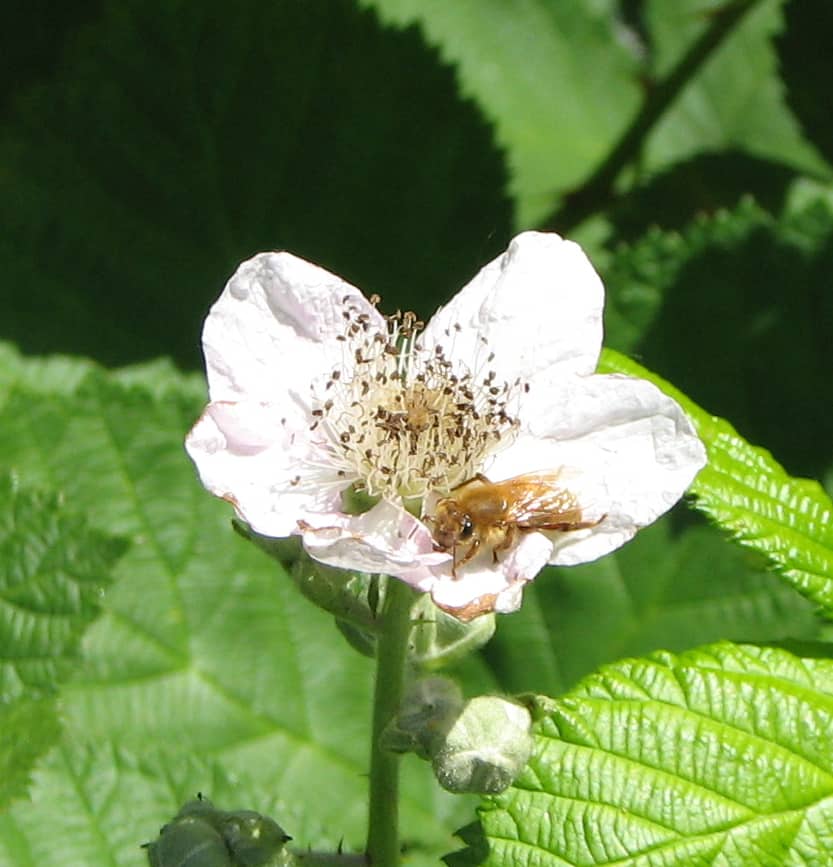Warm weather is just around the corner which makes this the perfect time of year to begin planting a garden. Working in the garden that has a proper stormwater management is relaxing, a great form of exercise and adds to aesthetics of your yard, plus you get lots of yummy home-grown veggies! But why stop here? Knock two birds out with one stone, and also add plants that serve as healthy food sources for honey bees, native bees and other native pollinators. The first step is selecting an ideal location for your garden if you don’t have a plot laid out already and you can…
Category: Fun Facts
Sampling in the Deep South
After spending about a month in California, I flew south to meet Jody Gerdts and travel around East Texas, Louisiana, and Mississippi for three weeks. While most of the bees in the country are in California for almond pollination, there are a few beekeepers that have or bring bees down to the South for producing the next generation of bees to sell. A number of the beekeepers the Midwest Bee Tech-Team works with migrate to the south for the winter, so we follow them. We visited nine beekeepers and did hygienic testing, and took samples for Nosema and Varroa for them. (Jody works on the…
Toyon
I am continuously impressed with the seemingly endless wealth of knowledge beekeepers accumulate over the years. Whether that knowledge is passed down from generation to generation, a product of their own curiosity, or a combination of both; a successful beekeeper, more often than not, possesses a fundamental knowledge of the topography of the land on which they keep their bees. Topography and climate generally go hand in hand and studying the distinctive characteristics of both can help to determine the most ideal places to locate your bee yards. The location of bee yards strongly influences management strategies, techniques, and decisions. For this reason beekeepers are…
Hurricane Sandy and the Seabees
Last weekend the east coast was hammered by Hurricane Sandy. Thankfully, all of us at the University of Maryland lab made it through unscathed, but some areas of the East Coast weren't so lucky. My heart goes out to everyone who experienced flooding and devastation. I kept my parents company during the hurricane at their home on the eastern shore of Maryland. The rain started to get heavy Sunday afternoon and by Monday morning the winds were blowing hard. I didn't want to brave the roads in those conditions so there was no chance of me escaping my parents by that point (just kidding!). Somehow the conversation turned to…
Halloween and the Honey Bee
Halloween is coming up ladies and that means you need to pick a costume and fast. For you bee enthusiasts out there it may be difficult to waver from variations on the cute honey bee costume popularized by the “Bee Girl” in Blind Melon’s 1993 video for “No Rain.” This year however I challenge you to forgo the stereotypically fanciful costume and go for realism. For example, one could simply wear their bee suit. If you live in a Northern climate it’s the practical way to go as it will keep you warm all night. Another benefit is that with a myriad of pockets you can…
Autumn and the Death of Drones
The autumn is here and it is getting pretty chilly in Minnesota. The shorter days and decreased temperatures also mean doom for the poor drones. While sampling colonies this past September, we saw worker bees drag out their reluctant brothers. A drone's function is to mate, and there isn't mating going on in the winter. No mating means the fellows are no longer needed in the colony and are just a drain on the colony's resources, and they are treated as such. They are forced out of the colony and eventually die of exposure. I understand why the worker bees drag the drones out and…
Bee Beard
http://www.youtube.com/watch?v=MiVTZbISMcE Last Saturday Rob and I volunteered to participate in the Patrick Ranch’s annual Country Faire and Threshing Bee. For more information about the event visit: http://site.patrickranchmuseum.org/index.html We got a call from Yvonne Koehnen earlier last week asking if we would be interested in doing a bee beard for the honey bee exhibit at the fair. The Koehnen family has been beekeeping since 1907. For more on the Koehnen family visit: http://www.koehnen.com/ I had never done a bee beard before so I was excited about the invitation. We put our weekend plans to fish the McCloud River on hold and happily accepted Yvonne’s invitation. There…
The Cost of Freedom
Rob and I tore this hive apart today to have a look at what was going on inside. If you listen closely you may be able to catch parts of our conversation. The video tells the story of these bees and its struggle to survive...It can be viewed at the link below: http://www.youtube.com/watch?v=wdSnVxtQSUo
The Promised Land 2: the airing
This week on National Public Radio, the Public Media program The Promised Land broadcasted the story on Marla I wrote about previously. It is a pretty good listen. Marla talks about how she got into bees, propolis, the Bee Squad for small time beekeepers, about the Bee Tech-Team we do, among other things. One of the beekeepers we work with, Bob Koehnen was interviewed and you can hear him talk about his operation. You can also hear me maniacally laugh in the background. Give it a listen! http://www.thepromisedland.org/episode/15-marla-spivak
Honey without Pollen
There has been an article circulating the bee world that I find really interesting and a bit disturbing. It is about how much of the honey purchased in stores lacks pollen. What happens is during the filtration stage of honey extraction, the company uses a really fine filter to remove anything that isn’t honey, so pollen, wax, propolis, bee parts, etc. To get it through the fine filter, it needs to be heated pretty high, which changes the taste of the honey. I am a big fan of straining out the random bee bits in the honey, but, to me, removing the pollen from honey…



